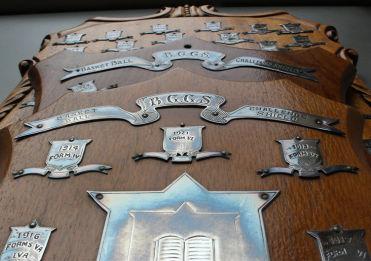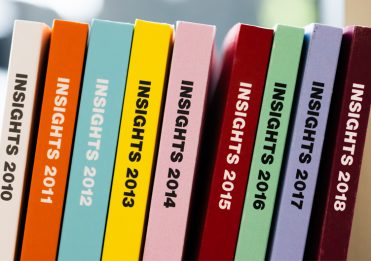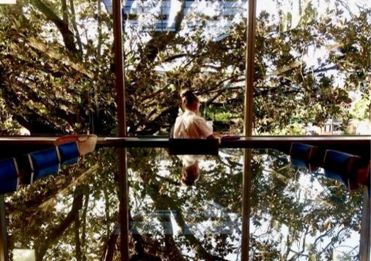In the library of Brisbane Girls Grammar School lies—what else—a book: Australian Short Stories (1955); compiled by Walter Murdoch and H Drake-Brockman. The story behind this book is, however, anything but short. Open the cover, and you will find a plate revealing the book was awarded in 1956 to Professor Coral Howells (Readdy, 1956) as a prize for the Merle Weaver Public Speaking competition.
Each year, the Merle Weaver Prizes for Public Speaking (Junior and Senior) are awarded on Speech Day to the winners of the titular competitions: those girls who have crafted and presented the most outstanding inspirational speech to their peers. Donated in 1954, the award commemorates the outstanding contribution of Miss Merle Weaver to Brisbane Girls Grammar School and exemplifies the School’s belief in the importance of creating strong, clear-thinking, independent women.
But, who was Miss Weaver, and what exactly is an ‘outstanding contribution’?

1912, Merle Weaver
Between 1918 and 1951—punctuated by stints away from Girls Grammar while pursuing alternate career pathways—Miss Weaver was a pioneering member of staff, educating multiple generations of Grammar girls. She was celebrated by another inspirational educator, then Headmistress Annie Mackay, as a teacher that ‘carrie(d) her classes with her’. Unfortunately, the verb ‘carry’ today oft has negative connotations—a burden, a heavy weight borne—but here it is used in its more inspirational sense. Perhaps a more contemporary way of conceptualising Miss Weaver’s ‘carrying’ is that she gave her students a metaphorical lift: her enthusiasm and spirit supported, sustained, and inspired girls to dream bigger than they ever thought they could; a move most crucial at a time when boosting the volume of the female voice was still considered a somewhat radical act.
In hindsight, that there would one day be a prestigious, highly inspirational public speaking competition bearing Miss Weaver’s name appears to be something of a fait accompli.

1918, Head Mistress Annie Mackay's glowing report on new-hire Merle Weaver in the Staff Confidential report
Prize winner Professor Howells recalls that it was her ‘adored English mistress’, Miss Alexis MacMillan, who first encouraged her to enter the prestigious competition, echoing the uplifting actions of Miss Weaver before her. It is particularly telling that Professor Howells—she who would one day become Professor Emerita at the University of Reading and Senior Research Fellow at the University of London—chose to inspire and uplift her cohort with a speech about the ‘power of language and the art of public speaking’.

Emeritus Professor Coral Howells
I am proud to say that my own name is listed with Professor Howells’ on the Merle Weaver winners archive, nestled amongst a rather gratifying number of future teachers, doctors, and professors.
In 2008, I had the pleasure and the privilege of representing Mackay House in the Senior competition: the italicised distinction being the result of the 1987 introduction of the original Merle’s Junior counterpart, inaugurally won by Erica Fryberg (1989). Like many competitors, I had never formally engaged in public speaking beyond spoken presentations for English—I was perhaps too enthusiastic a disputant for Debating. Professor Howells, by contrast, had engaged and found success in various eisteddfods and speech exams, but despite her enthusiasm considered herself a fundamentally ‘shy person’. Whether inexperienced and enthusiastic or shy and practised, Merle Weaver was—and remains still—a particularly daunting experience: having 200 pairs of eyes laser-focused and staring down at you as you pour your heart out is hardly a walk in the park. Professor Howells recalls wishing that ‘the floor would open and that (she) could disappear’, perfectly encapsulating the split second of panic prior to the performance.
However, in the face of such nerves, the desire to inspire won out for us both, as it has done for participants every year since the competition’s inception. There is something about the competition—whether held in Professor Howells’ gone-but-not-forgotten Assembly Hall or the ever-reliable Gehrmann Theatre—that sparks fire within and carries girls forth to their best.
The exhilaration of inspiration that strikes through speakers is clearly quite powerful, as the uplifting spirit of Merle Weaver often lingers within its participants long after the competition has ended. Citing as inspiration her ‘two brilliant English mistresses’, Miss MacMillan and Miss Marjorie Elliot, Professor Howells now teaches and lectures across the world, specialising in Canadian women’s literature and the works of her personal heroine Margaret Atwood.
As for me, I now have the great privilege—and occasional sense of imposter-syndrome-driven fear—of walking the path Miss Weaver paved and coordinating the Public Speaking Competitions at Girls Grammar.

2022, Dorothy Rae (11G) performing a blue-ribbon speech in the Merle Weaver Public Speaking Competition
Each year, I now watch as new chapters are added to the Merle Weaver story, with girls presenting inspirational, heartfelt speeches that aim to kindle compassion, advocacy, and critical thought. Below are some insights into the enduring significance of the competition by some of its most recent participants:
‘I had wanted to do this competition since Grade 6 when I first read about it in the School Magazine. It’s extremely valuable to have opportunities like Merle which allow people to realise their potential and express themselves,’ Ellen Baek (11E).
‘I decided to enter the competition when I found out about the theme (Generations). It interested me, as I am half Chinese and sometimes feel my Chinese culture is lost. So, I was interested in teaching others about my family. I also enjoyed the fact that, unlike an assessment, I could speak on what I wanted without having to worry about a grade,’ Faith Scott (11M).
‘Merle Weaver is an amazing experience, regardless of the outcome. It allows an individual to step outside of their comfort zone, voice their views, and showcase their public speaking ability to their peers. School has never been my forte … so growing up there weren’t a lot of things I was particularly good at or confident in. However, speaking and sharing my thoughts have always been my strong suit. It is vital that competitions like Merle Weaver exist because it allows for all types of students to show their talents and skills in a way that is different from academics and testing,’ Georgie Falting (11B).
As Professor Howells reflected on the ‘continuities’ in our lives—those few unbroken lines of inspiration one can follow from adulthood back to catalysing moments in our youth—she recalled a favourite quotation of hers by Atwood: ‘Age doesn’t make you a different person … I think it makes you a different version of who you already were’ (in Bunbury 2016). While the competition’s format, location, and topic choices have changed over the years, the inspirational spirit of Miss Weaver remains constant: a different version of what is always at its heart.

1924, Miss Merle Weaver on the steps of the BGGS Cottages
Ultimately, Miss Weaver’s enthusiasm and advocacy for girls’ education still speaks loudly across the decades. From the evocative memories inspired by Professor Howells’ 1956 Prize Book, to the powerful words of our most recent competitors, it is clear Miss Weaver’s spirit carries Grammar girls with her even now.
Thanks for the lift, Miss Weaver.
Ms Kat Talbot (2008)
English Teacher and Coordinator of Clubs and Activities

Coral Readdy’s Prize Book
References
Bunbury, S (2016) “Margaret Atwood: Why she decided to re-write Shakespeare’s The Tempest.” The Sydney Morning Herald. https://www.smh.com.au/entertainment/books/margaret-atwood-why-she-decided-to-rewrite-shakespeares-the-tempest-20161103-gsh3p3.html
Howells, Coral 22.07.23 email.

Professor Coral Howells (Readdy, 1956) Speech Day prize book and Miss Kat Talbot’s (2008) Valedictory Gift Book

Professor Coral Howells (Readdy,1956) Merle Weaver Public Speaking prize book




